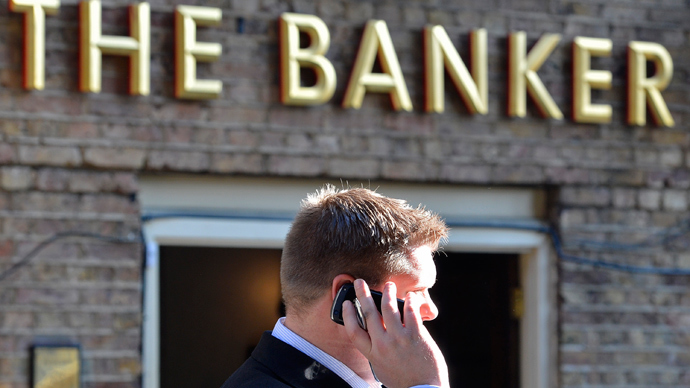Jail, bonus revocations loom large for UK banking bosses

British banking bosses may end up in prison if a new law to jail top executives for "reckless misconduct" is passed. The recent ‘Changing Banking for Good’ report has called on Chancellor George Osborne to clamp down on the country’s banking system.
The authors of the 571-page report recommend the creation of a new category of criminal offense to be used in future banking collapses. The study, which cost £850,000 to produce, took a year of work and evidence from over 250 witnesses.
The Commission, which was launched in the wake of the Libor-rigging scandal, proposes making it a
criminal offense for senior bankers to act with "reckless
misconduct" in carrying out their duties. The report also
examined the collapse of HBOS, which led to the bank’s former
chief executive James Crosby being forced to give up his
knighthood.
“Where the standards of individuals, especially those in
senior roles, have fallen short, clear lines of accountability
and enforceable sanctions are needed,” Commission on
Banking Standards Chair Andrew Tyrie MP told the Telegraph. He
went on to warn that drastic reforms are the only way to
restore trust in banks.
Chief executives could be stripped of their exuberant golden
parachute bonuses if their banks are bailed out directly by
taxpayers. The report called the City of London’s bonus culture
"thoroughly dysfunctional," and urged that a set of new
remuneration rules be established to allow bonuses to be
deferred over 10 years.
It is essential that dramatic changes be made to the way hefty
bonuses – and banking profits – are calculated, the report
stressed: "Many of the so-called profits reported by banks
in the boom years turned to dust when markets went into
reverse. However, for some individual bankers they had served
their purpose, having been used in calculation leading to huge
bonuses which could not be recouped."
According to the commission, the UK’s financial sector is not
responding to the "public demand for retribution" after
the 2008 banking crisis, and new laws are needed to "correct
the unbalanced incentives that pervade banking."
The proposed law would "create a new incentive for bankers
to do the right thing," the Guardian reported. "[The]
fact that recklessness in carrying out professional
responsibilities carries a risk of a criminal conviction and a
prison sentence would give pause for thought to the senior
officers of UK banks."
When banks are bailed out, regulators should be able to use
discretionary powers to strip bosses of their bonuses and
pensions, and when top bankers quit they should be required to
write a "handover certificate" outlining issues their successor
should consider, the report said.
While ratings agencies are pictured in the report as companies
with “business models founded on a conflict of
interest,” auditors have also been accused of adding fuel
to the fire: “Audited accounts conspicuously failed
accurately to inform their users about the financial condition
of banks,” and giving everyone a right to a simple bank
account is another challenge.
“Culture change is essential if the public is to be better served by the banking industry and we are to enjoy the benefits of having a strong global financial services industry without allowing it to hold taxpayers and the wider economy to ransom,” a Labour member of the commission, Pat McFadden MP, was quoted as saying.
The commission also recommended an audit of the number of women
on trading floors, claiming that employing more female traders
could reduce the risks.
The British Banking Association (BBA) described the ‘Changing
banking for good’ analysis as “the most significant report
into banking for a generation.”
“There has already been a huge amount of change in the industry since the financial crisis but the banks recognize that more needs to be done. Regaining trust is an absolute priority - we want the UK’s banking industry to once again set the gold standard for professionalism and integrity,” Anthony Browne of the BBA said, adding that they were eager to start “learning the lessons of recent years in order to deliver a banking industry which is trusted, financially sound and serves the interests of its customers, shareholders and society.”














